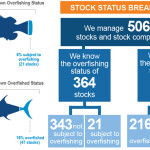Representatives from the United Kingdom’s seafood industry are criticizing Monterey Bay Aquarium Seafood Watch’s new Seafood Slavery Risk Tool.
The tool was launched in early February with the goal of helping retail and foodservice buyers identify fisheries at high risk of human trafficking, forced labor, and child labor, according to the organization.
U.S. restaurant chain The Cheesecake Factory is already using the tool to help the chain make sustainable seafood purchasing decisions, according to SeafoodWatch.
However, United Kingdom organization Seafish, along with U.K. scallop producers such as MacDuff, have criticized the tool’s “critical risk” rating of giant scallops and queen scallops from the United Kingdom.
“We recognize that there are issues on some scallop vessels in the U.K., which has been widely reported, and we are pleased that those involved are now being dealt with by the relevant authorities,” Aoife Martin, operations director at Seafish, told SeafoodSource. “However, it is not right to say that the whole U.K. scallop fishing sector has the same problems. The scallop industry and the wider seafood industry in the U.K. are appalled by what has been going on and are keen to see those in the wrong punished for it.”
The U.K. scallop fishery’s low rating was “based on multiple sources documenting forced labor occurring on board U.K.-registered scallop vessels,” the SSRT said.
“There is also evidence to suggest that forced labor and human trafficking occurs in other U.K. fisheries,” it added.
Also rated as “critical” is Atlantic bluefin tuna and swordfish from Taiwan and fishmeal from Thailand. Fisheries at “high risk” include albacore tuna from Japan, the Argentine Patagonian toothfish fishery.
In its reponse to the criticism, a Seafood Watch representative defended the “critical” score of the two U.K. scallops fisheries and said the new rating system has primarily received positive feedback on the SSRT.
“We think the risk profile is correct as we have only used evidence that with think is credible and accurate, and that we have been able to find,” Ryan Bigelow, program engagement manager for Seafood Watch, told SeafoodSource. “But we are also always interested to see additional evidence that anyone would like to share with us. We will evaluate the evidence, and if it lives up to the credibility criteria and is available in the public domain, we will run it through the decision tree and see if it impacts the risk rating for all, or part of the fishery.”
Seafish was so displeased with the original SSRT under development that it withdrew from developing the standards with the Sustainable Fisheries Partnership, Liberty Asia, and Seafood Watch.
“Our involvement in the forerunner of SSRT came to an end in autumn, 2017, in response to concerns that Seafish had identified with the earlier prototype's veracity. These concerns focused on the rigor and robustness of the methodology behind the tool, the objectivity of the information used to inform the tool, and the accuracy of the subsequent risk assessment results the tool produced,” Seafish said in a statement.
“In September 2017, when it became apparent that it would not be possible to address these concerns, Seafish mutually agreed with the other participants to exit the project prior to the launch of the tool,” the organization added.
Still, Seafish is encouraging the scallops industry to “provide up-to-date evidence using the contact details on the tool,” Martin said.
After Seafood Watch assesses the new evidence, it will change the profile within a few days, if merited, according to Bigelow.
“At this point, we cannot say whether we expect to change the U.K. scallop rating,” Bigelow said. “We'd need to see the evidence first.”
However, regarding the SSRT in general, “the feedback that the team has seen has been positive overall, particularly the reactions to the methodology the tool uses,” Bigelow said.






